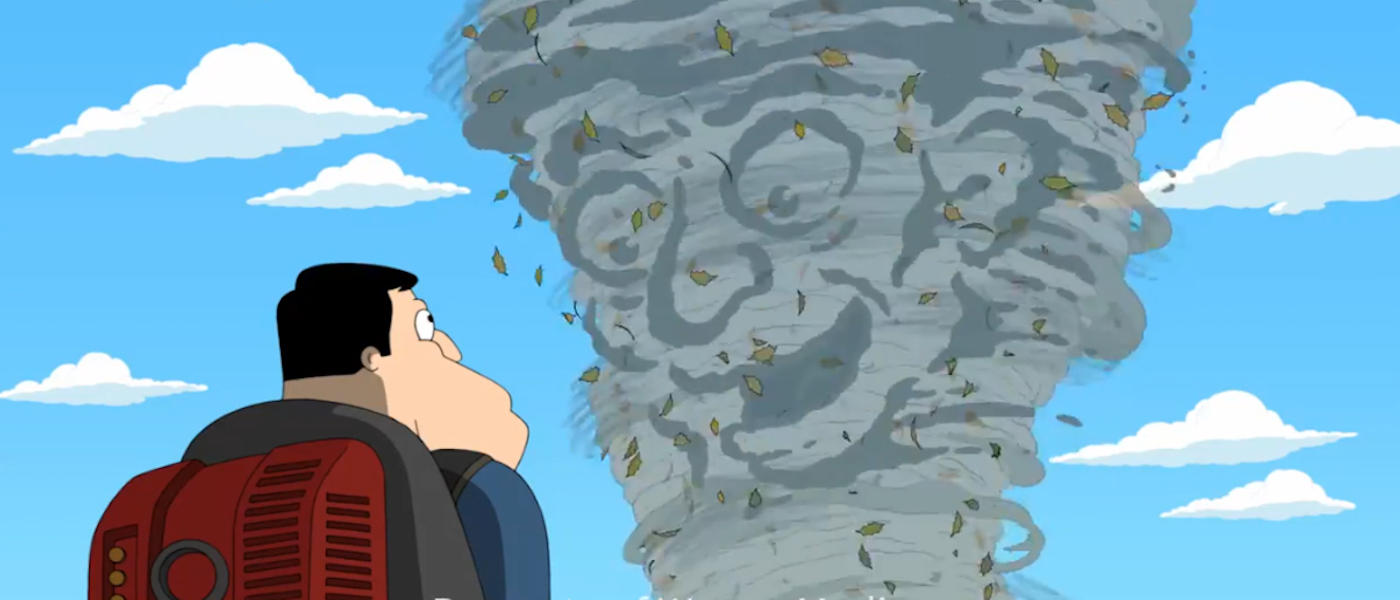Review: American Dad “American Data?”
Overview (Spoilers Below):
The temptation to look statuesque becomes too much for Stan and his friends, but when they realize that they don’t have the money that they thought they did, they turn to desperate measures to recoup the cash. A tense bond between Steve and his friends becomes even more exacerbated once they enroll in Roger’s prison role-play experiment. Despite their friendship, the group starts to learn that not everyone among them values each other equally and harsh decisions get made.
As Steve, Roger, and company try to keep their heads and not let the experiment get away from them, Stan wallows in considerably darker territory. The news that the CIA groundskeeper, Cloops, has passed away overwhelms Stan with grief and he reflects on just how much this friend means to him now that he’s gone.
Our Take:
Power is a frightening thing. It has the ability to really show what lies at someone’s core as it can both corrupt individuals and display their benevolence. People who have never had destructive thoughts before can get set down dangerous paths without even realizing it once a little power is added to the equation. American Dad explores this idea between Steve and his friends after it introduces the element of dishonesty and selfishness on Steve’s part. Steve’s act says a lot about who he is, but it says just as much for the people around him and “American Data?” puts those relationships to the test in a challenging, fun way.
The fortitude of the friendship between Steve and his friends has been established plenty of times before and it’s a bit of a relief that “American Data?” doesn’t go down the path of Steve needing to win back the trust of his buddies. Rather than Steve’s selfish act leading to a rift between him and his friends, it’s merely the catalyst to the gang’s need for some quick cash. There’s a number of different ways that this story could have played out, like Steve taking out a risky job proposition by himself to help pay back his friends, but it’s ultimately more satisfying to have everyone in on this one together. The group so quickly gets in over their heads that there’s more mileage to this scenario if they can confide in each other over how scared they are.
The scenario that Steve and company wind up in is psychological test that’s run by one of Roger’s personas. The Stanford Prison Experiment has been explored in a number of television shows before as a creative way to dig into character. It, much like Lord of the Flies, boils people down to their very essence and shows who they are and what they might be with a little bit of power. Once Roger jumps into the story the episode really picks up its pace and there’s some genuinely great gags that come out of very simple jokes, like his inability to pronounce “data” correctly or the (beautifully) lengthy sequence where he can’t start the experiment because he appoints everyone to guards and no one to prisoners. It’s a very good joke that balloons out of proportion in the best way possible.
Roger’s inability to grasp this concept actually leads into another interesting angle that the episode adopts. The natural direction to play this is that Steve and his friends would be separated and half of them would be guards and the others, prisoners. “American Data” chooses to make all of them guards, which seems like a less compelling position, but it still manages to highlight how they’re alike and dissimilar, albeit in different ways. It comes down to how Steve and his friends choose to reign over the other people in the experiment and this taste of power leads to some enlightening actions.
On the topic of the other people in the experiment that are stuck in the role of prisoners, American Dad turns to its resident overused supporting players, Tuttle and Billy. This is fine, but they really don’t bring anything new to the table here. It ultimately doesn’t matter anyway because the boys are so aggressive in the experiment that everyone quits. Again there’s an opportunity to split the friends up and force half of them to be prisoners due to the loss of subjects, but the episode takes on a more surprising development wherein Roger hires real prisoners to fill the roles. Immediately the prisoners assert their control and Steve and friends find their roles not only reserved, but also legitimately in fear for their lives due to the turn that it’s taken.
The second half of “American Data?” moves at a much faster pace. Steve does eventually flirt with selfishness over the needs of his friends, but it’s handled in a rather soft way. His acts never feel outwardly malicious and he still seems to care about his friends. It may be brief, but Steve’s time as “Songbird” among the convicts is very entertaining and the episode understands that it never hurts to have Steve singing as much as possible. Roger also defuses the whole experiment quickly, only to reveal that it was all a part of a much more elaborate plan all along.
The resolution to all of this also comes rather quickly as Steve runs through a gauntlet of get-rich-quick experiments to prove his dedication to his friends. There’s a certain poetic justice in how the very thing that didn’t need to be resorted to at the beginning of the episode is exactly what needs to be done at the end, but it’s still a conclusion that works and makes use of what the episode has already established.

Stan’s supporting story sounds really silly at first: the CIA groundskeeper, Cloops, passes away and because he has no family he bestows Stan with his prized possession, a leaf blower. The broader strokes of this are meant to be humorous, but this is actually deeply melancholy. The idea that Cloops’ favorite item was the very tool that he used to do his job is heavy, but so is Stan’s connection to the man. This isn’t a scenario where Stan is puzzled over why Cloops left him this item. Stan is crushed that he lost someone that was very close to him.
Stan spends the entire episode in grief and these little vignettes may feature laughs due to the persistent use of the leaf blower, they’re still steeped in sadness. The moment where he and his therapist strangely communicate by making their leaf blowers “talk,” is absolutely funny, but it’s hard to not also acknowledge the pain that it comes from and how it controls Stan. It’s even better that the episode doesn’t offer up flashbacks or even elaborate on how Stan and Cloops knew one another. Klaus explains that they were “very close” and that’s enough.
There’s a real tenderness to Stan’s pain that really worked for me. He barely even talks in the episode and he sullenly mopes through his scenes while the leaf blower communicates for him. The resolution to this morose story is really sweet and Stan finds a way to honor Cloops’ spirit. It’s a very wholesome act, even if it does go in a markedly fantastical direction. One could argue that the face of Cloops that manifests in the windstorm could still just be part of Stan’s grieving subconscious, but it doesn’t matter. It’s still a grand, cathartic way to finish what’s a surprisingly emotional story.
The chemistry between Steve and his friends can often be hit or miss, but their dynamic works well in this situation. There’s a very comfortable energy between all of them, whether it’s in the calmer beginning of the episode or after things become more intense for them in prison. Tiny moments like Barry’s banter over the amount of molecules he’s able to fit into Steve’s duck scrotum backpack play really well. “American Data?” also does a good job to juxtapose everyone’s behavior pre- and post-prison experiment and how they’re still there for each other, even if the obligations of being a friend become more extreme.
While it’s much less of a priority for the episode, the same sort of camaraderie is present during Stan’s CIA briefings. The idea that Bullock regularly gossips over the sex lives of the CIA’s custodial staff like it’s must-see television is also oddly fulfilling. Even Roger’s constant digressions over his love for binders, which just confound those around him, are a strong running source of levity.
American Dad has a number of excellent long-running jokes that show just how absurdly brilliant they can be, while still applying a weird respect to continuity. “American Data?” literally resurrects one of my favorite jokes from the series, CIA therapist Ray Petit (who’s still played by Ted Danson), and the continually vicious ways that he dies. As soon as he appears in the episode fans know that he’ll meet his fourth death by the time that the credits role, but it just creates even more anticipation over the eventuality. Even when you are prepared for this fatality, there’s no way to be properly prepared for it. It’s easily one of the most unexpectedly graphic and hilarious visuals since the infamous elbow drop from “Cops and Roger.”
“American Data?” is another successful entry in what’s been a strong season so far. The episode doesn’t exactly venture into new territory, but the dialogue and script is just weird and funny across the board. It’s a fun examination of all of these characters and Stan’s story is honestly a fantastic meditation on grief. Explorations into character and friendship put together with some truly unusual visuals help “American Data?” stand out and have plenty to offer, even if you’re not a fan of the story. Here’s hoping that Stan won’t have to lose another friend in order to bring on the next appearance of Dr. Ray Petit.
And for any of you out there that think the concept of calf implants is absurd, then why did a cool-headed, rational individual like Johnny Drama get them?


























Hi Ashley, thank you so much for reading and we love the feedback. Note that on that day we had 14th posts go up and only ten posts show on the front page, so it's possible the preview had already been archived by the time you got to it. One recommendation would be to add our RSS feed to your favorite news aggregator service like Feedly, this way you get all of the latest posts!